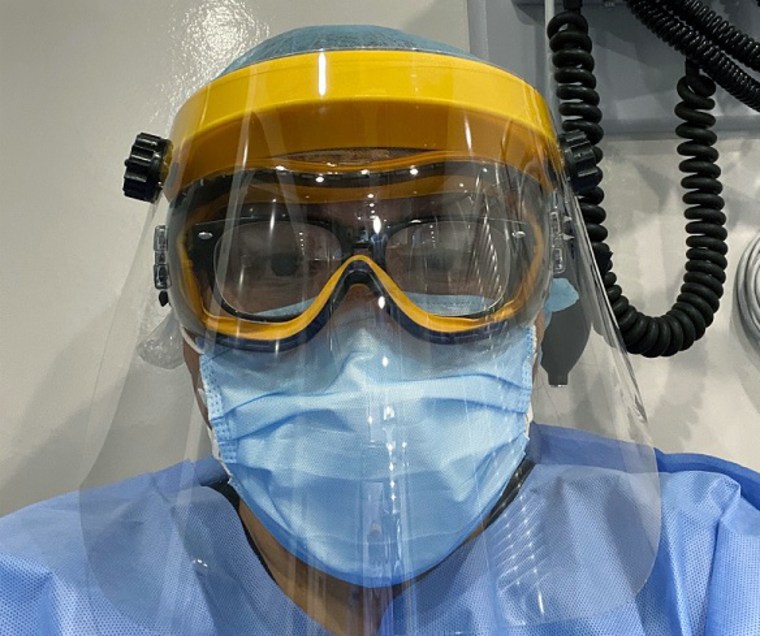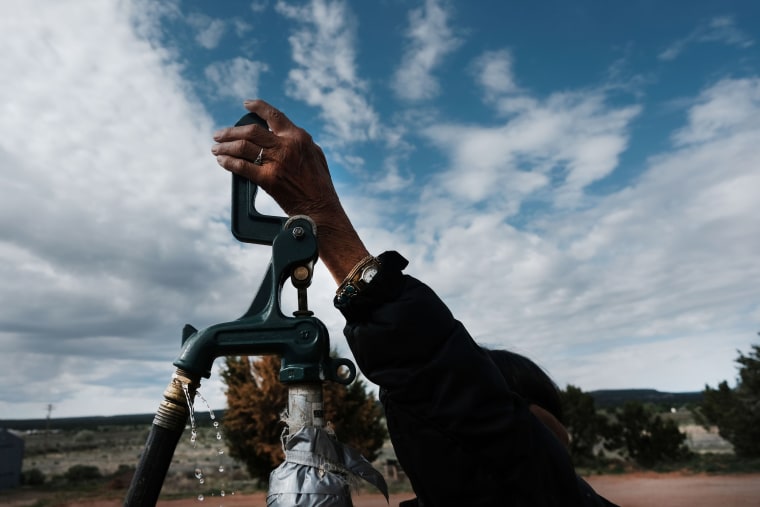Every third day, someone from Dr. Michelle Tom's family navigates their pickup truck 14 miles over the pothole-pocked dirt roads of the Navajo Nation to a community center. There, for about $95 a week, her family fills their water tank and hauls it back home to the double-wide trailer she shares with seven relatives in northeastern Arizona.
Or at least that's how Tom was getting water before she had to cut off physical contact with her family because of the coronavirus pandemic that has raged across tribal communities. For now, she is living with a co-worker to maintain her distance and prevent spread.
Full coverage of the coronavirus outbreak
"I haven't hugged anyone in weeks," said Tom, who spends her days treating COVID-19 patients at the Winslow Indian Health Care Center urgent care facility in Winslow, Arizona, as well as on the Navajo reservation.

Tom is one of the few doctors in her Navajo community on the front lines of the pandemic, and she has taken every precaution to try to stay healthy, including buying her own protective suit, goggles and face shield. But long before the virus started threatening her people, she was already facing a different sort of crisis: limited access to running water, a severely understaffed and underfunded health care system and underlying health conditions among her patients.
Now, a month after the tribe's first confirmed case of the coronavirus, the Navajo Nation, which stretches across parts of Arizona, New Mexico and Utah, has reached a grim milestone. At least 1,197 Navajo residents have tested positive for the coronavirus, while 44 have died, officials said.
With a steady increase in cases, people on the Navajo Nation are testing positive for the coronavirus at a rate more than nine times higher than people in the entire state of Arizona, based on reported cases and 2010 census data.
The coronavirus is exposing underlying fractures in the infrastructure of Indian Country, including health care and basic needs, like water, that have long been underfunded and, some say, ignored by the federal government.
"You're saying 20 seconds of wash your hands with water," Tom said recently. "We have to haul our water. ... We do not have plumbing. And that's how I grew up."
An estimated 30 percent of homes on the Navajo reservation, which has roughly 175,000 residents, don't have access to clean, reliable drinking water and have to haul it from local utilities, according to the Navajo Nation Department of Water Resources.
"There are times when it is closed for three days," Tom said.
When that happens, her family has to make another trip on another day. That is no small task, as the Navajo Nation is under curfew orders to curb the spread of the coronavirus.
"I feel fortunate that my family can do that," Tom said. "There are some families who don't have a water truck."

Tom, who practices family medicine, says that even without the strain of the pandemic, she doesn't have the resources she needs to provide adequate medical care and has access to only two ventilators.
"We cater to 17,000 Navajo, and people come from Apache, Hopi, as far as three hours away," Tom said. "Our resources are limited. Rural medicine is hard enough. We've always been short-staffed in general."
As stipulated in treaties with Indian tribes, the U.S. government has an obligation to provide health care to all Native Americans.
"Because of the land that the tribes ceded to the United States, the United States has a trust responsibility to Indian tribes, and health care is one of those," said Rep. Deb Haaland, D-N.M., who fought to include Native American tribes in the Coronavirus Aid, Relief, and Economic Security (CARES) Act, a $2 trillion stimulus package passed in March.
The legislation provides $8 billion for Native American and Alaska Native tribes, although the National Congress of American Indians, a public education and advocacy group, estimated that tribes would need $20 billion. Initially, Haaland said, the White House allocated no direct relief for tribes.
Despite the United States' obligation, a 2018 report by the U.S. Commission on Civil Rights found that health care spending per person by the Indian Health Service was $3,332 — only a little over one-third of federal health care spending per person nationwide.
"The scarcity of the things that a lot of people take for granted, like water and electricity, is a true struggle for many, many people here," said Dr. Jarred McAteer, who practices internal medicine at Tuba City Regional Health Care Corporation in Arizona.
McAteer said his hospital has been running at capacity for weeks and has had to repurpose parts of the facility to care for coronavirus patients, many from the Navajo Nation.
Download the NBC News app for full coverage and alerts about the coronavirus outbreak
"It's really hard to follow [the Centers for Disease Control and Prevention's] recommendations of washing your hands if access to water is a challenge and that water is supposed to be used for drinking, for cooking, for livestock," McAteer said, noting that many Navajo families would typically have to reuse water in a wash basin at home.
Tom and McAteer agree that the lack of infrastructure — from water to electricity to paved roads — coupled with high incidences of underlying health conditions are partly why Indian Country is being hit so hard by the coronavirus.
Moreover, Native Americans require treatment for alcohol and drug use at a rate almost twice the national average, according to the U.S. Department of Health and Human Services. Last week, after a request from the Navajo Nation government, New Mexico Gov. Michelle Lujan Grisham suspended alcohol sales at gas stations, convenience stores and grocery stores near the reservation to reduce the spread of the coronavirus. (Even before the pandemic, alcohol sales were banned on the Navajo Nation itself.)
Navajo officials have been inundated with calls and emails from concerned family members who say their loved ones who battle alcoholism have been drinking during the pandemic, sharing bottles and not practicing social distancing, Navajo Nation Vice President Myron Lizer said in a statement.
It's a struggle Navajo tribe member Allie Young, 30, knows all too well.
After her younger brother died by suicide 11 years ago, her older brother started drinking and now suffers from alcoholism, she said.
"We're constantly on the phone with my brother and uncles who struggle with alcoholism and about why they have to stay away," said Young, standing beside her grandfather's horse pasture. "They have to think about the elders."
Young, who had left the Southwest for Los Angeles to work in the film and entertainment industry, returned home to her family when the coronavirus outbreak worsened. She started a Facebook group called "Protect the Sacred," hosting livestreams and leveraging her network of celebrities, such as actors Paul Rudd and Mark Ruffalo, to share recommendations for staying safe at home and away from tribal elders.
"They carry a lot of the knowledge and ceremonies that we, the young people, are still learning," Young said with her hand on her heart, adding, "Our cultures are in jeopardy right now if we lose our elders."
Growing up, Young spent her summers at her grandparents' home on the reservation in Arizona, where there was no running water or electricity.
Like many Navajo families, many of Young's relatives live together in a multigenerational home, which makes elders even more vulnerable during the pandemic as people are told to shelter in place and practice social distancing.
"When you have family members struggling with alcoholism and then they come home to a packed household, and then you go to a health facility that doesn't have enough resources, [personal protective equipment] or ventilators to help," Young said, "it's just a recipe for disaster."

